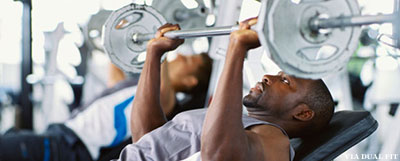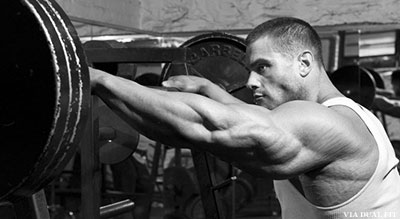
By DualFit.com
If you're looking to stay healthy and have a lean, muscular physique, you have to lift weights or do some sort of resistance training. This just goes without saying. But if you're lifting weights too often and not letting your body fully recover from workouts, you're actually doing more harm than good. Overtraining your body can lead to muscle loss, and who wants to put themselves through an arduous workout just to lose muscle. Nobody, right?
How often should you lift?
Most fitness experts will tell you that you should be hitting the gym 2-3 times per week to maintain muscle mass and to maximize gains. While this is generally good advice the fact of the matter is every body is different. Everybody is different and every body is different. Some people have a quicker recovery times than others and are able to get back to the gym faster. Most people though usually require a couple of days to rest before they are fully capable of pumping iron at their 100 percent maximum effort.
Resting means getting the right amount of sleep and taking in the necessary amount of calories to help those overworked muscle fibers heal. It also means not over-stressing the body by engaging in high impact activities that hamper recovery time. Going to the gym to run on the treadmill or ride the stationary bike or even taking a fitness class can be done, though. It all depends on how you feel. If it has been a couple of days and you’re still kind of sore from your last weightlifting session than give it another day. Your body will thank you and respond accordingly the next time you hit the weights.

Dangers Of Overtraining
We are living in the fattest of times. Almost 70 percent of the population can be classified as overweight or obese. People are getting fatter, exercising less and eating more than they ever have at any time in our civilization's history. So how can exercise possibly be a bad thing when it's compared to such startlingly negative statistics? If anything people should be going out of their way to exercise as much as they can, right? Wrong.
Like everything else exercise should be done in moderation. This is especially true when it comes to lifting weights. Too much of it and you could actually be doing more harm to your body than if you didn't exercise at all. Below are some signs that you might be overtraining your body.
Signs Of Overtraining
1) You're failing to lift the same amount of weight that you usually lift at the gym: If you're used to benching 225 pounds at 8 reps/3 sets and those numbers are dropping, it can be a sign of overtraining. If you can't knock out those 40-pound dumbbell curls like you used to, it could indicate overtraining. Obviously you want to go to the gym to get bigger and stronger and see your numbers increase at each session. But if you're regressing, it might be time cut back on the weightlifting.

2) If your joints, bones and limbs hurt, it can indicate overtraining: After you have lifted weights something called Delayed Onset Muscle Soreness (DOMS) occurs. This is the time period before you start feeling those sore muscles that you have so tirelessly worked on in the gym. But DOMS is a good thing because it means you have broken those muscle fibers down and and now they have to build themselves up bigger and stronger than before. But when that soreness becomes a constant, nagging thing and it is affecting your subsequent workouts, it could mean you’re overtraining.
3) One of the best things about working out and lifting weights is the feeling you get after a grueling, intense session. It's that rush of endorphins you get that keeps you feeling good for hours even days and keeps you coming back for more. Having that feeling and seeing your muscles grow and respond with each and every workout.
But if you start feeling moody as if there's a dark cloud over your head after each workout that could mean you're overdoing it. There is a fine line between lifting weights until failure and failure to be able to lift. You should be somewhat motivated to want to hit the gym for your next session. If you're not and your grumpy, grouchy, achy and tired all the time than you are going to have to reassess your workout regimen and schedule.
More From DualFit.com:
-- Claire Rae: Fitness Model, Fitness Trainer
-- HIIT: High Intensity Interval Training
-- Better Cardio Call: Track Or Treadmill?
-- Interview: A.J Jacobs, Author Of 'Drop Dead Healthy'
Popular Stories On ThePostGame:
-- Why High Heels Make Your Breasts Sag
-- The Truth About Swiss Balls
-- 5 Awesome Arm Curls You've Never Tried
-- Coregasm Phenomenon Is Confirmed By New Scientific Study








